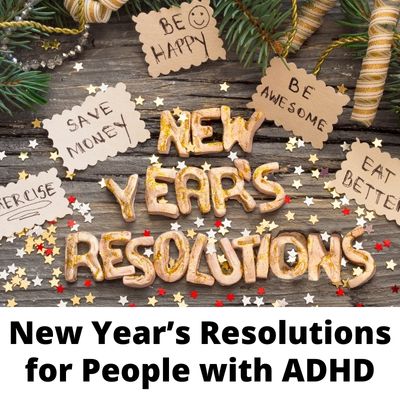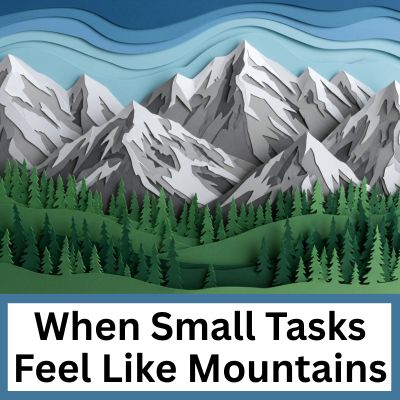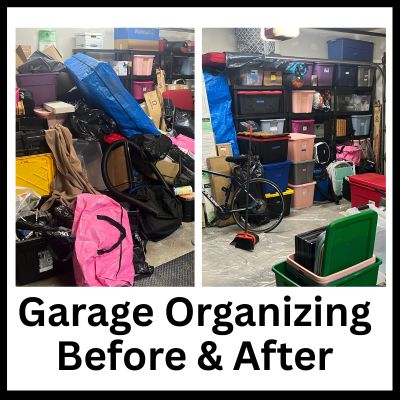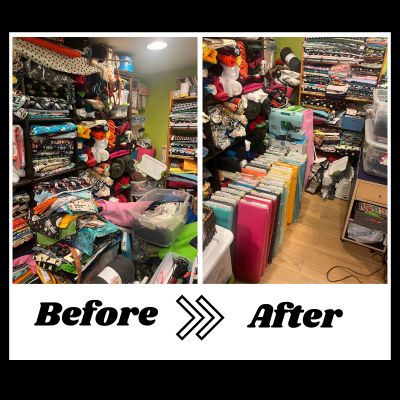New Year’s Resolutions for People with ADHD

It’s the time of year that everyone is starting to think about their new year’s resolutions. It’s fun to dream about how much you want to change and grow in the new year. Many people with ADHD feel very optimistic about all the changes they are going to make, but may also feel discouraged from failed attempts in previous years. A common thought for people with ADHD is, “I just need to try HARDER”. This type of thinking can really diminish someone’s sense of self-esteem, and continuing to try to do the same thing the same way without success can drive people a little bonkers. People with ADHD just need to try DIFFERENTLY. In this post, I’ll give you some ideas about how to craft your new year’s resolution so that forward progress can be made.
-Resolution: Read More
I remember in college, I had a huge reading assignment, and I asked one of my neurotypical peers how she was able to get it done so quickly. She just said she sits down and just does it without procrastinating. As someone with ADHD, reading is INCREDIBLY difficult for me. Before I learned that people with ADHD don’t need to try harder, but they need to do things differently, I kept thinking that I was such a lazy dummy for not being able to get my reading done. I need complete silence, good lighting, a comfortable place to sit, to be well rested, and for my blood sugar to be really stable. There are other accommodations I’ve created for myself such as taking ADHD medication when necessary, diffusing essential oils to help me focus, and using a CES Ultra machine to help mitigate stress.
If you’re someone who wants to read more in the new year, are you someone who can just “sit down and do it”? or do you need to create the conditions so you can read? You may have one goal of reading 20 minutes a day or 12 books a year (or whatever sounds reasonable to you), but you may also need an accompanying goal of getting more rest, eating more vegetables or protein to help stabilize blood sugar, or scheduling a consultation with a psychiatrist or psychiatric nurse who can help assess you for ADHD medication. Once you’ve set up the conditions so you can actually read, I highly recommend the book “Atomic Habits” by James Clear.
-Resolution: Get Strong
Some people with ADHD are great at exercising regularly because they crave it. It’s easier for them to go for a run or go to the gym than it is to lounge in front of the TV all day. Think about what happens if you have an energetic dog that you keep inside all day. That’s me when I don’t get enough movement in. I need to get exercised the same way a dog does. But if you’re not someone who naturally gravitates towards exercise, you’ve got to figure out how to trick your brain into getting fit. If you’re not a self-starter, getting a regular gym membership might not do you much good. You may need to schedule private sessions with a personal trainer, or go to a gym that has group exercise classes. You might want to buy a “class pass” so that you can try out a few workout classes in your area. Or you may want to join a running or hiking club. Something else fun is to take horseback riding lessons. I love hot yoga and hot pilates classes, especially with all this cold and rainy Seattle weather. I highly recommend working with a physical therapist if you have anything in your body that hurts. Dr. Jen Aglubat of Seattle Sport is a miracle worker! Whatever you pick, make sure you have fun doing it. If you’re not having fun, you’re probably not going to stick with it!
-Resolution: Lose Weight
It may not be fun to hear, but you can’t exercise yourself out of a bad diet. If you want to lose weight, you’re going to have to change your eating habits. If you’re eating a lot of sweet or salty food, you will be stuck on a rollercoaster, trying to reach equilibrium. Since impulse control is an executive function often lacking with people with ADHD, willing yourself to eat less junk food can be harder for people with ADHD than neurotypicals. Going on a diet like the Whole 30 is a great way to learn new eating habits, but oftentimes after the 30 days are over, many people fall back into their old ways of eating. If you’re really wanting to learn how to eat whatever you want in moderation, I highly recommend using the calorie counting app called Noom. You can sync it to your Apple Watch, Oura Ring, or whatever device you want to use (or you don’t have to use another device) and it changes your calorie allotment as you burn calories throughout the day. Noom was created by psychologists, so the daily lessons provided help you build more awareness around your eating habits. It’s a great way to create lasting change in your diet.
-Resolution: Save More Money
People with ADHD often have lower self-esteem than their neurotypical peers due to the years self-inflicted mental/emotional abuse and bullying from friends and family members from not getting their act together more quickly. This lower self-esteem equates to lower self-worth, which equates to a smaller bank account. A smaller bank account paired with impulse control issues that are classically found in people with ADHD means that it’s harder for people with ADHD to save money. It’s much easier for a neurotypical person to make a budget and stick to it, because they don’t have all the same executive functioning deficits (impulse control/self-restraint, emotional regulation, planning/problem solving etc.) as someone with ADHD. While it is important to be able to make a budget and stick to it, what’s more important is to foster a healthy sense of self-worth. The most effective way of doing this I’ve found is through hypnotherapy. Marisa Peer has lots of self-hypnosis tracks available on her website and through the iTunes store that can help build confidence and self-esteem. If you’ve tried these, and they haven’t worked, it’s possible that you have another issue that is blocking your ability to save money. I recommend working with Seattle based hypnotherapist Herrieta Obriko or Lisa Shook to help you meet your financial goals.
-Resolution: Get More Sleep
If you’ve ever been really sleep deprived, you know how important getting a good night’s sleep is. But if you’ve never really been THAT sleep deprived, you probably don’t even realize what a difference getting an hour or two of extra sleep a night will be. If you seem to be functioning just fine on an average of 5 hours of sleep, motivating yourself to make a change might be really hard. FOMO (fear of missing out) is real, as is revenge bedtime procrastination. But when you DO get more sleep on a regular basis, your mood and focus will improve, your body will work better, you’ll recover faster, and you’ll have more energy to get your home organized. Getting more sleep has many more benefits as well! If you want to get more sleep, I recommend getting an Oura ring to help you see how much sleep you’re actually getting, and to notice trends that will help you get better quality sleep. Since people with ADHD are already functioning with an executive functioning system that’s not as activated as our neurotypical peers, we don’t have as much leeway with cutting back on sleep. In addition to lowering your caffeine, alcohol, and sugar consumption, some things that can help you get a better night’s sleep include wearing an eye mask, using blackout curtains, wearing ear plugs, having crystals such as amethyst, black tourmaline, celestite, and amber nearby, and using a grounding mat.
-Resolution: Have an Organized Home
If you’ve tried repeatedly to have an organized home, and you haven’t made much progress, it’s time to try doing something differently. Where does the problem come from? Do you just have too much stuff? Why do you have too much stuff? Or is it that you need to establish homes for the stuff that you have? Have you established the homes, but you don’t have a good maintenance routine in place? Figuring out the root of your clutter will help you get to the bottom of it. By nature, people with ADHD are almost always disorganized for many reasons. Usually it’s a combination of executive functioning skills being offline, paired with low self-esteem, and a lack of knowledge about how to organize. It’s also most likely an issue of not having enough time or energy to get the job done. If you’ve tried organizing without success, consider hiring a professional organizer like myself. A professional organizer can help you come up with unique (and non-judgmental) solutions for conquering your clutter. There are also lots of online support groups to help people combat their clutter. Another option is to work with a hypnotherapist to help you align how much inventory you’re really willing to maintain in your home. Stop the intake of excessive clutter: reduce your junk mail, have a shredder easily accessible for when you bring the mail in, shoot for “one thing in, one thing out”. People with ADHD want to do it all! Say “no” to overscheduling yourself so that you can have the energy needed to maintain your home. Look online for free cleaning schedules to help you stay on track. Break your projects down into manageable chunks, and put your to-do’s on your calendar. Estimating the time everything will take can be really hard, but just do your best and adjust as needed.
A few other tips
People with ADHD LOVE novelty. When you’re creating a plan of how to keep up with your goals, make sure to update it regularly to keep it fresh and new. Keep your goals manageable. By making small incremental changes, you’re way more likely to create lasting change. Although being optimistic is generally a great trait to have, sometimes people with ADHD are TOO optimistic about all that they can accomplish, and then feel like the pits when they can’t get it all done. If you’re someone who’s announced lofty goals only to forget about them a week later, you’ve got to change your goal setting neural pathways. Dial your ambition WAY back (just for now!) so that you can align what you say you’ll do with what you will actually do. Having this type of integrity will help you build trust with yourself and others. If you’ve said you’re going to do something and you can’t follow through, own up to it. You don’t need to feel guilty or bad about not doing what you said you would do, but by cleaning up what you said and acknowledging the promises you’ve made, you’re building credibility with yourself. Think about a friend or family member who said they would meet you at a certain time. If they weren’t on time and didn’t acknowledge the time discrepancy, you’d probably be pretty mad, and wouldn’t trust that they would follow through next time. If someone has been late and then acknowledged the agreement and promised to get it right next time, you’ll feel more respected. Repeated promise violations erode trust, make you feel bad, and show a lack of respect. Don’t do that to yourself. I also love incorporating an element of spirituality into my goal setting. You could pray to ask for help. You could also write your goals down and put them under a crystal or crystal grid, or anywhere that is meaningful to you. Another fun option is to infuse your goals with Reiki to help them spread their seeds onto the earth.
What are your new year’s resolutions? I’d love to hear about them!

By Jean Prominski, Certified Professional Organizer
Check out my media exposure: Seattle Sparkle in the Media
Download my free 5 week journal The Seattle Sparkle Method to Get Organized and Stay Organized
Sign up for my free 4 Day Color to Declutter Challenge.
Become part of a like-minded community by joining my Facebook Group, Declutter and Organize with Seattle Sparkle.
Ready to book a consultation? Complete this form.
For artwork to energize your home, order through jeanprominski.com.




